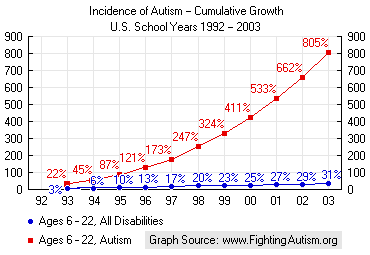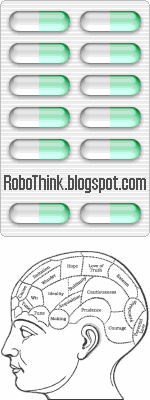Autism Epidemic
The number of reported cases of autism has increased dramatically over the past decade. Possible causes that researchers have put forward include pollution, food additives, childhood vaccinations, genetic factors, or an improvement in diagnosis and screening. If it were true that the increase is due to better diagnosis child psychiatrists would have to make the shameful admission that members of their profession were not up to the job of diagnosing autism correctly just one decade ago. More likely, some new environmental factor accounts for the increase. There is a related genetic condition called Fragile X Syndrome, but instances of a genetic disability cannot account for an increase of more than 800% in one decade. But don't rely on genetic fundamentalists to admit it anytime soon. Spurious genetic theories have been put forward to explain away many other increasingly common ailments.
If it were true that the increase is due to better diagnosis child psychiatrists would have to make the shameful admission that members of their profession were not up to the job of diagnosing autism correctly just one decade ago. More likely, some new environmental factor accounts for the increase. There is a related genetic condition called Fragile X Syndrome, but instances of a genetic disability cannot account for an increase of more than 800% in one decade. But don't rely on genetic fundamentalists to admit it anytime soon. Spurious genetic theories have been put forward to explain away many other increasingly common ailments.
As far back as 1991, an article in a medical journal noted that children born in a certain hospital in Japan were significantly more at risk of becoming autistic (Lancet 1991; 337, 1357-8: Autistic and developmental disorders after general anaesthetic delivery). Ryoko Hattori et al. discovered that the hospital's routine was to induce labour a week before the expected date of birth by the administration of a complex mixture of drugs.
Obstetrician Michel Odent has compiled a large data bank of research which demonstrates that unnatural or adverse conditions during gestation, birth and early infancy can have long-term consequences in terms of psychological and physical health. Vaccines containing potentially harmful substances would fall into that category. As a practitioner, Odent developed the maternity unit at Pithiviers Hospital in France in the 1960s and '70s. He is an advocate of birthing pools and the author of around 50 scientific papers and 11 books, of which "The Scientification of Love" is probably the best known.
ADHD. As with autism, the number of children diagnosed with Attention Deficit Hyperactivity Disorder has increased dramatically over the past decade. There are still no cognitive, metabolic or neurological markers for ADHD and no medical tests, as this 2006 article in The Scotsman newspaper points out: Fix the diagnosis not the children.
Depression. As with autism and ADHD, there has been a huge increase in the incidence of depression in recent decades. Neurobiologist Steven Rose notes that this makes it highly unlikely that 'genetic predispositions' are the main driving force behind the worldwide depression epidemic.

As far back as 1991, an article in a medical journal noted that children born in a certain hospital in Japan were significantly more at risk of becoming autistic (Lancet 1991; 337, 1357-8: Autistic and developmental disorders after general anaesthetic delivery). Ryoko Hattori et al. discovered that the hospital's routine was to induce labour a week before the expected date of birth by the administration of a complex mixture of drugs.
Obstetrician Michel Odent has compiled a large data bank of research which demonstrates that unnatural or adverse conditions during gestation, birth and early infancy can have long-term consequences in terms of psychological and physical health. Vaccines containing potentially harmful substances would fall into that category. As a practitioner, Odent developed the maternity unit at Pithiviers Hospital in France in the 1960s and '70s. He is an advocate of birthing pools and the author of around 50 scientific papers and 11 books, of which "The Scientification of Love" is probably the best known.
ADHD. As with autism, the number of children diagnosed with Attention Deficit Hyperactivity Disorder has increased dramatically over the past decade. There are still no cognitive, metabolic or neurological markers for ADHD and no medical tests, as this 2006 article in The Scotsman newspaper points out: Fix the diagnosis not the children.
Depression. As with autism and ADHD, there has been a huge increase in the incidence of depression in recent decades. Neurobiologist Steven Rose notes that this makes it highly unlikely that 'genetic predispositions' are the main driving force behind the worldwide depression epidemic.

0 Comments:
<< Home